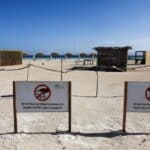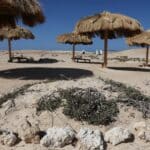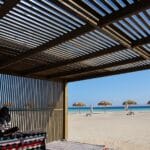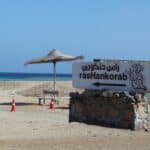In the heart of Egypt’s countryside, within Minya Governorate, the village of Bani Khaled—affiliated with the Samalut district—faces a severe environmental threat.
Thick white dust blankets homes and fields, mixing with the air the residents breathe daily, silently suffocating the region’s agricultural life.In this report, Ecoris for Sustainable Development brings you scenes from the painful reality observed by its team during a field visit to the village, highlighting the environmental and health impacts of quarrying and industrial activities in the area.
We invite you to read the full report and stand in solidarity with the people of Bani Khaled in their right to a clean and safe environment.
To view the full report, click here.
To view the full report, click here.
April 2025
Introduction
Since early 2025, Ras Hankorab—located within the Wadi El-Gemal – Hamata Protected Area—has become the subject of growing concern across media outlets and among environmental activists.
Reports of recent changes in the area have raised critical questions about the level of protection afforded to one of Egypt’s most ecologically significant and sensitive natural reserves.
More than just a beach, Ras Hankorab represents a unique ecological haven, home to endangered species and rare marine and coastal ecosystems.
It also holds global importance as a prime destination for eco-tourism.
In light of these developments, Ecoris for Sustainable Development has prepared this field report to document the evolving situation, assess the potential environmental and legal impacts, and support ongoing efforts to safeguard this natural treasure for future generations.
We invite you to explore the full report and stand with us in the defense of Egypt’s protected areas.
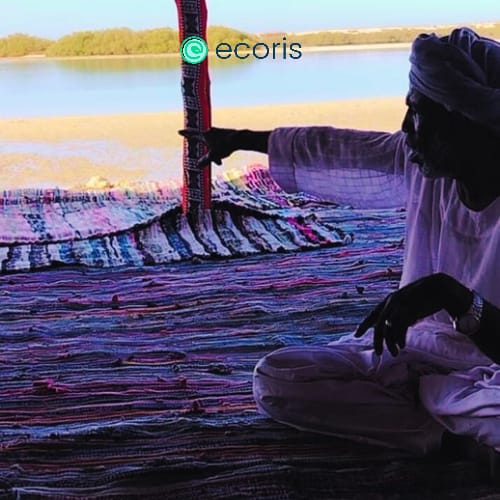
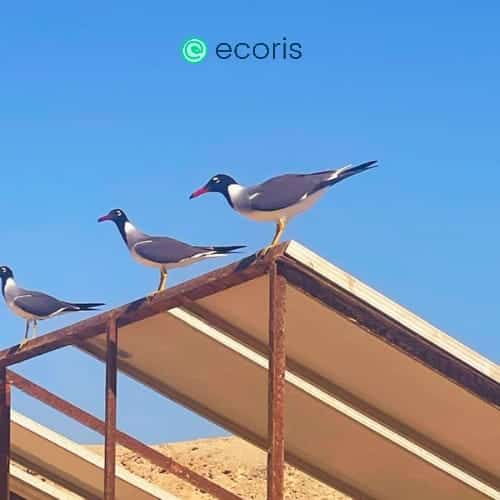
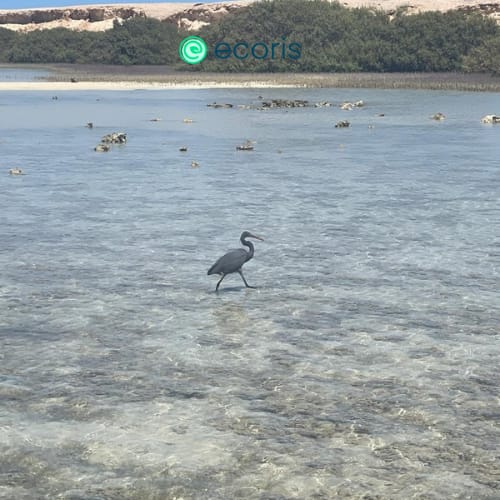
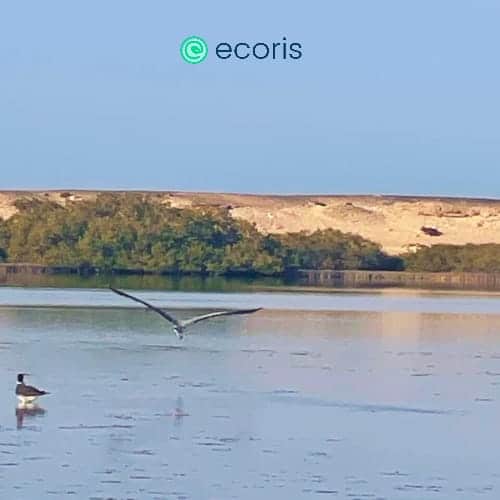
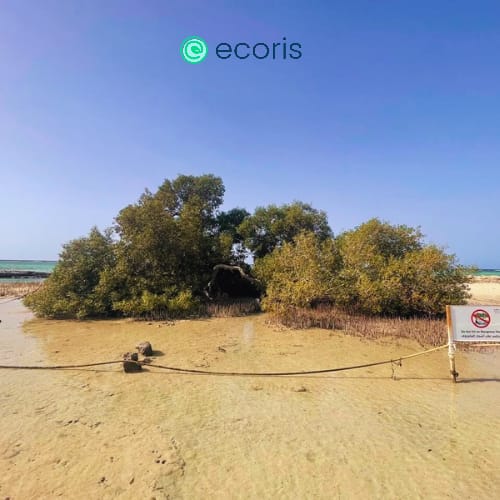
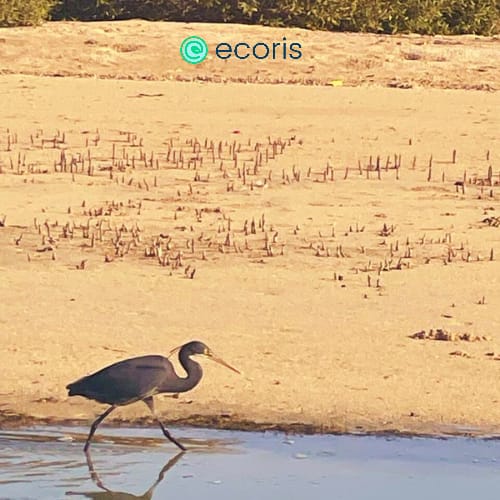
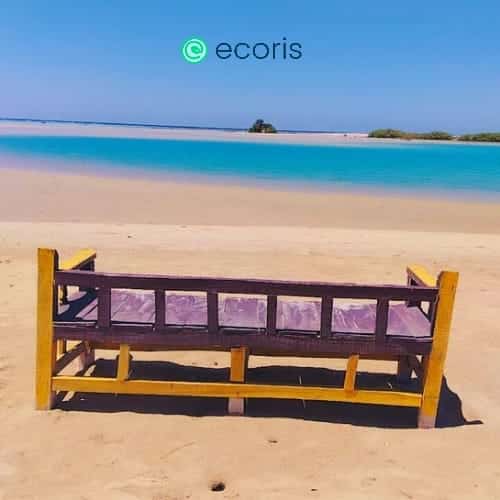
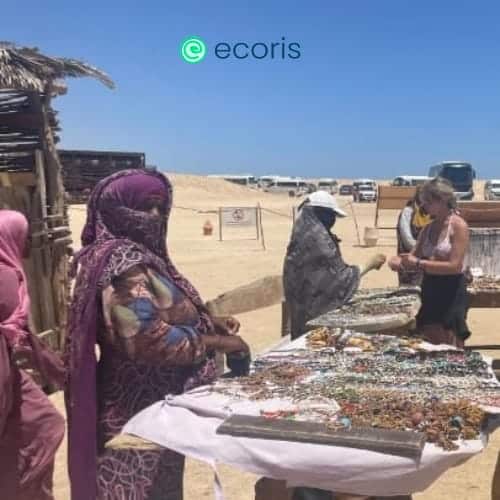
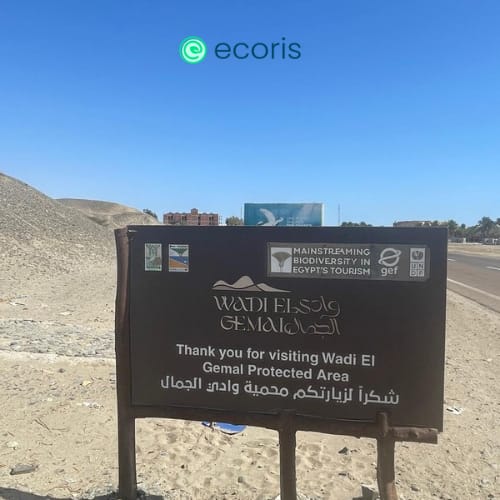
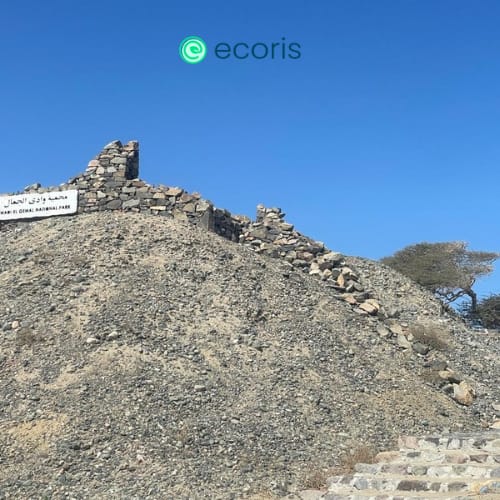
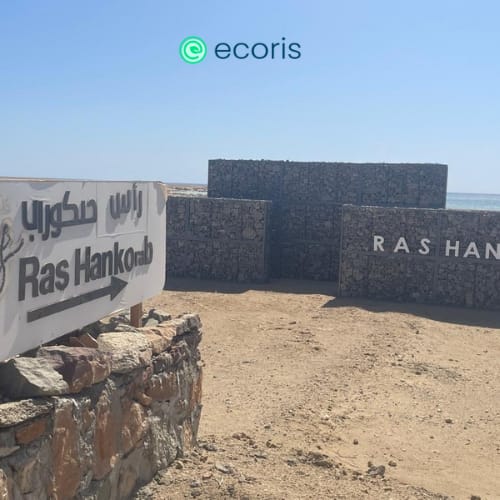
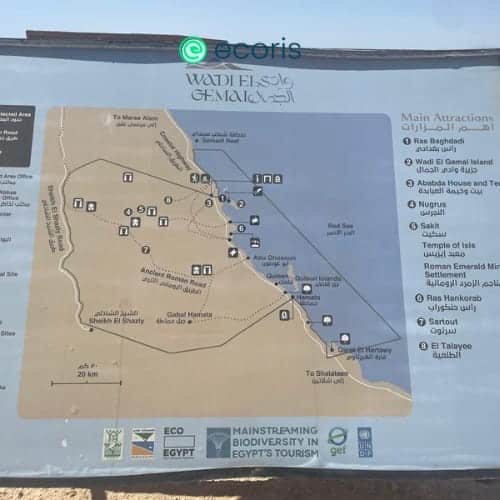
Source
Summary
Tourism vital to Egypt’s economy.
Egypt aims to boost visitors, develop facilities.
Conservationists warn development threatens Ras Hankorab Beach.
Red Sea reef has tolerated warmer climate.
RAS HANKORAB, April 15 (Reuters) – Ras Hankorab Beach, a pristine spot on southern Egypt’s Red Sea coast with crystal clear waters and flat white sands, is the jewel of Egypt’s Wadi el-Gemal National Park, home to one of the country’s last untouched marine ecosystems.
Today, the beach, a 90-minute drive from Marsa Alam international airport, and a four-hour drive from the huge, fast-growing resort of Hurghada, is closed off by a wooden fence, and campaigners are battling to halt its development with, according to the original plans, dozens of accommodation huts, a restaurant and a farm.
Conservationists warn a fragile ecosystem supporting turtles, the coral reef, sea grasses and myriad species of fish is under threat and locals fear losing a precious natural resource forever.
Fighting economic crisis, Egypt has been selling investment licenses in its national parks to developers in the hope of raising income. Projects vary in size and scope.
Tourism is one of the most important pillars of the Egyptian economy. A recent UN Tourism report estimated annual tourism revenue at $14.1 billion in 2024, more than double Suez Canal revenues.
With 17 million visitors in 2024, an annual increase of 17%, Egypt sees potential to boost numbers with more infrastructure, air connectivity and sustainable, coastal and desert-focused holidays. Turkey had 62 million tourists in 2024, Greece 35 million and Dubai 18.7 million.
Environmentalists and local communities warn that even light construction on the beach would destroy one of Egypt’s last untouched marine sanctuaries.
Asmaa Ali, executive director of Ecoris, an Egyptian sustainable development and conservation group, said the national park and beach is one of the world’s most important spots for biodiversity.
“It has one of the most precious coral reefs, located at the reserve’s beach. It also has sea turtles at risk of extinction, it has mangrove trees,” she said.
Sherif Baha el-Din, a co-founder of Wadi el-Gemal national park, said tourists seek unspoiled nature, not concrete resorts.
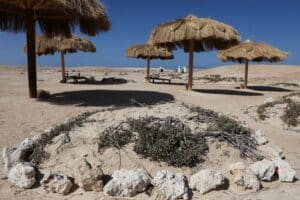
Over the past decade, changes to the law have allowed spots within Egypt’s national parks to be used for commercial projects. Environment Minister Yasmine Fouad said projects within protected areas including national parks surged from 10 in 2016 to 150 in 2024, with revenue increasing by 1,900%.
Reporting by Mohamed Ezz Editing by Alexandra Hudson
Source
Ras Hankorab Beach, a pristine natural sanctuary in Egypt’s Wadi el-Gemal National Park, faces potential development. Conservationists fear this will harm its unique ecosystem, which includes coral reefs and endangered sea turtles. Economic pressures have led Egypt to offer investment licenses in national parks, raising environmental concerns.
Ras Hankorab Beach, famed for its untouched beauty and clear Red Sea waters, is now at the heart of a debate on conservation versus development. Originally a haven in Wadi el-Gemal National Park, the site is said to be under threat due to plans for tourist accommodations, a restaurant, and a farm.
As Egypt tackles economic challenges, selling investment licenses for national parks has become a strategy to increase revenue. This move, however, alarms environmentalists who argue that development could destroy Ras Hankorab Beach’s fragile ecosystem, home to coral reefs, turtles, and diverse fish species that have remained undisturbed.
Local and international conservation voices, including those from Ecoris and the Hurghada Environmental Protection and Conservation Association, warn against the plans. Despite attempts to balance investment with ecological preservation, critics argue Egypt’s approach could undermine the essence of eco-tourism and overlook the rights of future generations.
(With inputs from agencies.)
A battle is brewing on Egypt‘s Red Sea coast, where a pristine beach faces potential development within a protected national park.
Ras Hankorab, a jewel of Wadi el-Gemal National Park known for its untouched marine ecosystem, is currently closed off, its future hanging in the balance.

Located 90 minutes from Marsa Alam airport and four hours from the bustling resort of Hurghada, Ras Hankorab boasts crystal-clear waters and white sand beaches.
However, original plans propose transforming this natural haven with accommodation huts, a restaurant, and a farm. Conservationists are raising the alarm, warning that development threatens a fragile ecosystem supporting turtles, coral reefs, sea grasses, and diverse fish species. Local communities also fear the permanent loss of this precious natural resource.
Egypt, grappling with economic challenges, has been selling investment licenses within its national parks to stimulate income. Tourism represents a cornerstone of the Egyptian economy, with a recent UN report estimating annual tourism revenue at $14.1 billion in 2024, surpassing even Suez Canal revenues.
While Egypt welcomed 17 million visitors in 2024, a 17 per cent annual increase, the government sees potential for further growth.
Located 90 minutes from Marsa Alam airport and four hours from the bustling resort of Hurghada, Ras Hankorab boasts crystal-clear waters and white sand beaches.
open image in gallery
Located 90 minutes from Marsa Alam airport and four hours from the bustling resort of Hurghada, Ras Hankorab boasts crystal-clear waters and white sand beaches. (REUTERS)
By expanding infrastructure, improving air connectivity, and promoting sustainable coastal and desert tourism, Egypt aims to compete with regional tourism giants like Turkey (62 million visitors), Greece (35 million), and Dubai (18.7 million).
The question remains whether this economic drive will come at the cost of irreplaceable natural treasures like Ras Hankorab. Environmentalists and local communities warn that even light construction on the beach would destroy one of Egypt’s last untouched marine sanctuaries.
Asmaa Ali, executive director of Ecoris, an Egyptian sustainable development and conservation group, said the national park and beach is one of the world’s most important spots for biodiversity.
The question remains whether this economic drive will come at the cost of irreplaceable natural treasures like Ras Hankorab. Environmentalists and local communities warn that even light construction on the beach would destroy one of Egypt’s last untouched marine sanctuaries.
It has one of the most precious coral reefs, located at the reserve’s beach. It also has sea turtles at risk of extinction, it has mangrove trees,” she said.
Sherif Baha el-Din, a co-founder of Wadi el-Gemal national park, said tourists seek unspoiled nature, not concrete resorts.
The more development on the Red Sea coast, the more important it becomes to leave this small part untouched,” he said. “If we must develop, let’s talk about where. But the best thing to build here is nothing at all.”
The Hurghada Environmental Protection and Conservation Association (HEPCA), an NGO, notes that the reef is so significant because it is one of the world’s most tolerant of climate change, and has the potential to repopulate other reefs and even bring back some from extinction.
Revenue from National Parks
Over the past decade, changes to the law have allowed spots within Egypt’s national parks to be used for commercial projects. Environment Minister Yasmine Fouad said projects within protected areas including national parks surged from 10 in 2016 to 150 in 2024, with revenue increasing by 1,900 per cent.
Egypt’s Environmental Affairs Agency initially offered the operation of Ras Hankorab for tourism use to investors, albeit under strict conditions. However, responsibility has now moved to a government fund, the minister said in a recent presentation on Wadi el-Gemal. She declined to comment further.
Worried conservationist groups have filed an appeal with a state prosecutor, alleging development is not meeting protection laws and would damage a public resource.
Locals say they have been sidelined. Many once made a living from low-key eco-tourism but are now effectively barred from the beach.
“I used to take my kids there for free. Now, I have to pay 250 Egyptian pounds ($5) just to enter,” said Mohamed Saleh, a tribal elder. “They didn’t consult us. They didn’t hire us. They just took over our land.”
Fouad and other Egyptian officials argue that eco-tourism and investment can coexist. She defended development of the beach and Wadi el-Gemal as a “controlled expansion,” ensuring sustainability while attracting revenue.
Her ministry will monitor and evaluate the proposed projects in sensitive areas, including Ras Hankorab, Ras Boghdady, and the world-renowned diving spot the Blue Hole, she said. However, critics see the ministry as lacking the resources for that.
Egypt has lost environmental expertise due to low wages and limited resources, conservationists say. In 2007, Wadi el-Gemal had 20 wildlife specialists monitoring biodiversity. Today, there are only a handful, said an NGO member.
The Environment Ministry and the State Information Service did not respond to a Reuters request for comment.
This [development] completely undermines the idea of eco-tourism. How does handing over protected land to private investors align with conservation?” said environmental lawyer Ahmed El-Seidi.
“The state is obliged to protect its natural resources and to protect the rights of future generations in these resources.”
We’re thrilled to announce that Ecoris for Sustainable Development has received the Carbon-Conscious Website Accreditation from the Eco-Friendly Web Alliance (EFWA) for our official website Ecoris.green, placing us among the world’s most environmentally-friendly websites!
After a comprehensive environmental audit, our website was found to produce just 0.22 grams of CO₂ per visit — far below the global average! To ensure a genuinely positive impact, EFWA even estimates our emissions at 1g CO₂e per visit, taking responsibility for more carbon than we actually emit.
Why does this matter?
Because the digital world has a real-world environmental impact.
Digital activities account for around 3.7% of global greenhouse gas emissions — more than the entire aviation sector (which produces about 3%). As our reliance on digital platforms grows, so does their environmental footprint.
That’s why Ecoris is stepping up, not just as an environmental advocate, but as a leader in sustainable digital transformation.
What have we done?
- Built a fast, low-energy website
- Hosted our platform on green, eco-friendly servers
- Optimized content and design to reduce carbon output
- Committed to yearly carbon offsetting or insetting
Our message: Digital transformation must be climate-conscious!
This certification isn’t the end of our journey — it’s just the beginning.
We’re committed to innovation, sustainability, and a cleaner digital future. And we invite organizations, initiatives, and individuals to start their own path toward digital sustainability.
You can even request a free audit of your website here:
https://ecofriendlyweb.org
Visit us at: www.ecoris.green
And check out our official accreditation page:
https://ecofriendlyweb.org/client/ecoris
On February 6, 2025, the Ecoris Egypt Scouting and Guiding Group was launched as a pioneering initiative aimed at fostering a new generation of environmental leaders. This initiative merges traditional scouting adventures with environmental education and sustainability.
Targeting children and youth aged 11 to 18, the group provides hands-on training in eco-friendly survival skills and engages participants in practical environmental projects such as coastal cleanups, reforestation, and reducing plastic waste. They also embark on unique experiences like marine expeditions, eco-friendly camping, and innovating sustainable solutions such as solar ovens and handmade water filtration systems.
We don’t just teach scouts how to live in nature—we teach them how to protect it.
Through this initiative, we believe that change starts with young people and that fostering environmental awareness from an early age is a fundamental step toward a sustainable future. The initiative is part of the “Green Generation” project, through which Ecoris empowers young generations with the knowledge and skills needed to safeguard the environment.
Stay tuned for more environmental activities and adventures with the Ecoris Egypt Scouting and Guiding Group!
Ecorees for Sustainable Development praise the Egyptian government’s decision to impose fees on plastic bag producers as part of implementing the Extended Producer Responsibility (EPR) principle. This is a significant step toward reducing reliance on single-use plastics and mitigating their negative environmental impact.
This decision marks a positive development in regulating waste management and promoting environmental sustainability by encouraging producers to take responsibility for the safe disposal of waste generated by their products. It also paves the way for more sustainable environmental solutions. However, the success of this initiative depends on several key factors, including:
✅ Promoting eco-friendly alternatives such as biodegradable and reusable bags, ensuring their affordability to encourage widespread adoption.
✅ Encouraging innovation and investment in recycling solutions to ensure the effective management of plastic waste.
✅ Expanding consumer and business awareness on the importance of reducing plastic use and supporting sustainable products.
At Ecorees, we urge continued governmental and community efforts in this direction and reaffirm our commitment to contributing to alternative solutions and advancing a circular economy culture. Through our environmental initiatives, we actively promote recycled fabric bags as a sustainable alternative to plastic bags.
Together, we move toward a future free of single-use plastics.
To the Presidency of the Republic, relevant government authorities, regulatory bodies, civil society organizations, and the media,
Ecoris for Sustainable Development expresses deep concern over reports of ongoing excavation and construction activities in the Ras Hankorab area within Wadi El-Gemal Protected Area, one of Egypt’s most significant natural reserves known for its rich biodiversity. These activities pose a serious threat to the nesting sites of endangered sea turtles, cause severe damage to unique coral reefs, and undermine Egypt’s global environmental and ecotourism reputation.
⚠️ Environmental Risks and Serious Consequences:
✅ Destruction of sea turtle nesting sites, accelerating their extinction.
✅ Severe damage to unique coral reefs, which are among the most resilient marine ecosystems worldwide.
✅ Violation of Egypt’s international commitments to nature conservation, damaging the country’s environmental reputation.
✅ Decline in ecotourism, a vital source of income for Red Sea communities and a key contributor to the national economy.
📢 Our Urgent Demands to the Presidency and Government Authorities:
🔹 Immediate presidential directives to halt all construction activities in the Ras Hankorab area until their legality and environmental impact are assessed.
🔹 An urgent and transparent investigation into the ongoing activities, with findings disclosed to the public.
🔹 Strengthened environmental oversight to prevent future encroachments on protected areas.
🔹 Involvement of civil society and environmental experts in decision-making processes concerning the development or use of natural reserves.
🌍 Saving Wadi El-Gemal is a national responsibility. Protecting it is not a luxury but a duty and commitment to Egypt’s environmental and economic future.
📢 We urge the Presidency and relevant authorities to take immediate action before it is too late!
Ecoris for Sustainable Development
